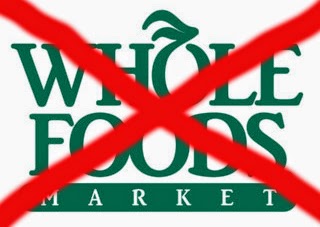“Systematically overcharging customers for packaged foods since at least 2010”
Whole Foods Market began as a great countervailing force to the pervasive corporate supermarkets that dominated the marketplace back in 1980. Starting in Austin, Texas the company built a reputation based on high quality whole foods, a customer service philosophy rooted in education and a distinctly vegetarian focus. They earned the trust of the many “back to nature” communities everywhere.
Contrast that story of their beginnings to their current reputation as a powerful corporate food behemoth that has totally lost touch with their original customer base. Any food naturalist who walks into a Whole Foods Market store today will find so much to be off-putting. The food prices went from a CO-OP level pricing to now overcharging their customers … “systematically”.
Consumer trust in Whole Foods Market was shattered last week when a New York City government investigation revealed that the supermarket had been systematically overcharging customers for packaged foods since at least 2010. At first, Whole Foods representatives stridently denied the claims — but today, company executives admitted that the supermarket chain was, in fact, guilty of overcharging.[1]
What an incredible reversal of food delivery philosophy — from great discounts in the 1980s to overcharges in the 2010s. That’s not all that’s changed; the amount of packaged and frozen and processed foods are also more than ever … just as the prices are for all the added packaging materials and food processing. Their stores are now so big to accommodate so much more overpriced, expensively packaged and highly processed food products.
What’s the point? Whole Foods Market can no longer be trusted. Many don’t even trust the organic food certification that is found on many of their products. Once they went full-bore corporate they adopted many of the schemes and scams which all the big supermarket chains have employed for many decades. In short they have radically altered their central organizing principle to serve their new corporate masters, instead of their once loyal customers.
Last week, the New York City Department of Consumer Affairs said it was conducting an ongoing investigation into local Whole Foods stores after finding that the chain had “routinely overstated the weights of of its pre-packaged products.” That was true of meats, of seafood, of dairy, and of baked goods. Basically, nothing prepackaged was safe. In all, the Department of Consumer Affairs tested 80 different types of prepackaged products and found that each had some items with mislabeled weights. On top of that, “89 percent of the packages tested did not meet the federal standard for the maximum amount that an individual package can deviate from the actual weight,” the department reported. Hence “systematic problem.”[2]
How did this happen?
Once Whole Food Market became a publicly traded corporation their loyalties have gradually shifted to the new owners — the shareholders. Over time maximizing annual profits became the overarching goal, rather than serving the organic, whole foods crowd that once trusted them to deliver the produce at reasonable prices.
The Whole Foods Market bakery section is a perfect example of how much their corporate philosophy has degenerated. What you will find there are remarkably overpriced baked goods in fancy packages that look more fake than freshly baked. Nothing looks real in their bakeries anymore, nor do the bakery products taste real … you know, like the good ole-fashioned and freshly baked, wheat-free and gluten-free, sugar-free and additive-free baked goods they used to actually bake on site.
Whole Foods Market is now the quintessential health food store on corporate steroids. The best way to show them that we reject their corporate greed is to shop elsewhere. There are plenty of alternatives in most cities and towns where they can be avoided; at least until they get their act back together by serving the customers first, second, and third.
Holiday Meals & the Whole Foods 365 Brand
For anyone who has shopped at Whole Foods over the years there are two significant developments that have occurred which must not go unmentioned. First, are their exceptionally overpriced holiday meals which are all extraordinarily rich, each seemingly made with the very same ingredients. It’s as though each different entreé is the same as the next one, in addition to being overly processed and unsavory.
Their signature Whole Foods 365 brand is likewise their version of corporate processed food All-American style. Ridiculously expensive for what you are really getting and heavily processed and packaged, these packaged foods are everything the first Whole Food Market was founded to offer a vital alternative to. Obviously, their slick marketing campaign wants you to eat their processed and packaged food 365 days a year.
Conclusion
Whole Foods Market has morphed into the biggest and baddest health food chain in America. Their core mission is now oriented around making the stockholders money; customer satisfaction comes somewhere down the line. Except for those city slickers who love overpaying for substandard ‘health food’, why would anyone ever continue to shop there.
A recent study conducted by Wolfe research has found, through comparing the prices of organic products at Whole Foods to the same organic products at other grocery stores, that you’ll actually wind up spending more on the same groceries at Whole Foods. The cost of buying all of those organic products at Whole Foods totaled $260, while the groceries at the other stores ended up costing $215, a $45 difference and a major reason to shop co-op. [3]
Sources:
[2] Slate.com


